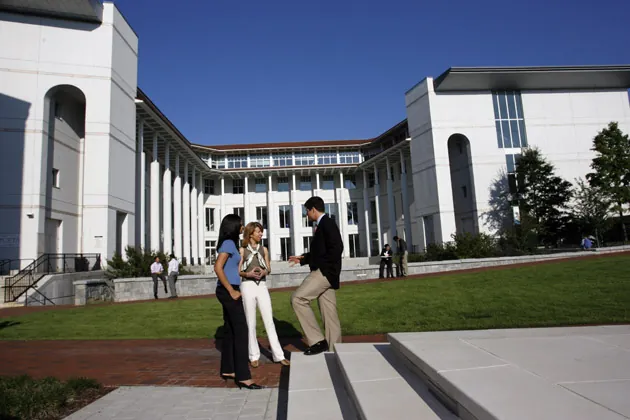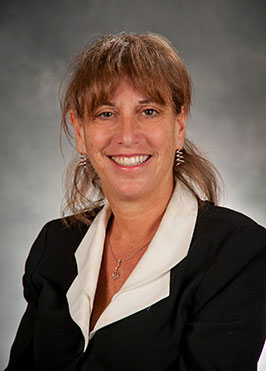Andrea Hershatter graduated with an MBA from the Fuqua School of Business at Duke University in the late 1980s with every intention of getting a high-powered job at a big corporation. However, her career options at the time were limited because she had to stay in Durham, to be with her then fiancé, now her husband.
“There were not tons of choices,” said Hershatter, who ended up accepting a job working for a local radio station. “I wasn’t going to work for a tobacco company and I didn’t want to work for a bank.”
She never expected she’d end up back at Fuqua, but that’s where she found herself a year later. Fuqua was looking for an assistant director of admissions, and Hershatter was looking for a job that was more intellectually challenging. “I got the Fuqua job relatively easily, and, as many people do, backed into academics and admissions,” Hershatter said.
Three years later, Hershatter moved to Atlanta, right around the time Emory University’s Goizueta Business School was trying to catapult itself into the national spotlight. John Robson, the former under secretary of transportation in the Carter administration and the new charismatic dean of Goizueta, was eager to add Hershatter to his team as director of admissions. Robson made a compelling case for her to stay in education, rather than return to the corporate world. “I went to a set of meetings and said, ‘Oh my God, I have to work for this guy.’”
Twenty-six years later, Hershatter is still at Goizueta, having climbed the administrative ranks to her current position as the school’s senior associate dean and director of the undergraduate business program, a role she’s held since 1996.
Under her leadership, the undergraduate BBA program at the school has thrived. It has been ranked amongst the top ten undergraduate business programs for the last nine years by Bloomberg Businessweek, and currently holds ninth place. The program is ranked No. 13 by U.S News & World Report.
Hershatter has put her own distinctive stamp on the program, drawing on her background as an expert on the millennial generation and her interest in entrepreneurship and entertainment, including creating a joint concentration in film and media management.
Hershatter spoke with Poets&Quants’ Alison Damast about what she’s learned in the two-plus decades she’s spent at Goizueta, the school’s innovative leadership curriculum and why she believes entrepreneurship is the “new black “ for today’s college students.
There has been an explosion in undergraduate business education in the last few years. What do you think are some of the reasons for it?
As I’m sure I don’t have to tell you, undergraduate business is the single most popular major and has the most popular classes. By an overwhelming percentage, the number one reason kids go to college is so they can get a better job when they graduate. So despite people holding onto what I think are very valuable notions about liberal arts and critical thinking, there is absolutely a movement towards the practical end of education. That is echoed by the government wanting to ensure through education that people are employable. So a lot of the messages for millenials in college and the generation beyond them is you have to figure out ‘what do I do when I grow up’ very early and work towards doing that. It is much more the European model. It has pretty significant implications for which majors will be subscribed to and in what ways. Even the major conferences on liberal arts are addressing this and asking what they can do.
There are many fabulous colleges that don’t have business schools that have a terrific track record of bringing people into the marquis companies because those companies are hiring just smart people. So you can be a philosophy major from Hampshire College and get a job at McKinsey. However when the economy is not doing well and jobs are tight, clearly the first jobs go to people who can hit the ground running. It’s less of ‘we’ll help you grow’ and more of ‘who can get things done now that I have nobody to do the things that used to be done.’
Even after the last eight years when jobs were really scarce, undergraduate business to a lesser but more significant extent didn’t get really as hurt as everyone else. An MBA hire was a big ask, but you could get a lot of work done by a good undergraduate business students, so they still got hired.
There also is pressure on people for the need for applied education. The fact is it is so expensive to raise a child. The millennial generation is raised with every opportunity, but it still takes a quarter of a million to get kids through college and at the top ten, three quarters of a million. So there is a little bit of parental pressure on return on investment. There is also a push because of kids returning home and living at home.
What differentiates Goizueta’s undergraduate program from other schools, and what are some of its strengths?
When they come in we have a co-curricular focus in addition to the regular things they become familiar with. It is called leadership but it is really personal and professional development. So from our perspective we put intellectual growth first and then combine the personal and professional. We’re very cognizant of the fact that college at four years is a big transition moment from dependent childhood to independent adulthood. We spend a lot of time on the leadership curriculum with immersive experiences.
I don’t know if we still are, but for a time we were the only undergraduate program doing 360-degree surveys with students. Every student when they come in has their parents and co-workers fill out a survey, then they get a report and an hour of one-on-one coaching with members of the staff and advisors to talk about competency and opportunities for growth. We cluster them so we can tell a student is really strong if they have a meaningful impact on their organization. If they are not so strong we coach them over the next two years to have experiences that will help them grow in a lot of ways. We do the same thing in our business communications courses. We examine what their propensities and behaviors are, and how they communicate.
In addition, as they walk in the door we do a simulation that tapes them doing things like prioritizing work assignments or giving a talk on the fly. Then they get externally rated, judged and are given feedback. We do that again as graduating seniors and we see how they grow in those ways. We are really, really big on developing self-awareness and team orientation. It is less about how they work on teams and more about how they navigate through multiple concurrent team assignments. They have a propensity to be team leaders but the challenge is to be effective team players. There’s a whole co-curriculum course on about learning and growing and developing as people.
We also have something coming out of the career management center that helps them figure out effective ways to develop yourself as professional, such as being a good communicator and intervening effectively.
The second piece, which is brand new for the first time next year, is a capstone course in their senior year they’ll take either in the fall or the spring. It consists of five weekend intensives where they’ll be dealing with a messy complicated ambiguous program that crosses function fields. It may be in the form of a case competition, simulation or debate.
What are you seeing at your school in terms of application numbers and general interest in an undergraduate business degree?
We have absolutely seen an uptick in interest. Because students enter the school their junior year, we only admit from Emory University and Oxford College. We don’t take outside transfers. If people outside Emory want to come, they still have to do a year of liberal arts before they apply. We have tried to be very respectful of a good balance across Emory how many students ought to be business school versus liberal arts students while still maintaining the opportunity for as many students to come to business school as can. It is tricky.
For example, six years ago we graduated 270 to 280 students. This year we are graduating 329. It has been going up, but if you just did it based on interest without simultaneously increasing the bar for admissions, you’d have a much larger population.
There is a lot of self-selection that happens and a lot of pre-counseling going on, and the uptick in applications keeps raising the bar. So if you go back eight years ago, probably the average freshman and sophomore GPA coming into the school was a 3.3, and now it is a 3.6. We do not admit on SAT scores, but they’ve gone up in a semi-similar fashion.
We are also more selective than we’ve been in the past amongst applicants. One big change used to be if academics were what we were looking for, we didn’t so much have to worry about anything else because students had earned their right to come into the business school. We’ve changed that and put a lot more emphasis on student involvement across campus and recommendations, the typical things that go into applications to college. We are looking for continued evidence of that. Now someone who has only done coursework doesn’t get into the business school independently. That gives us a more engaged and involved community.













Questions about this article? Email us or leave a comment below.